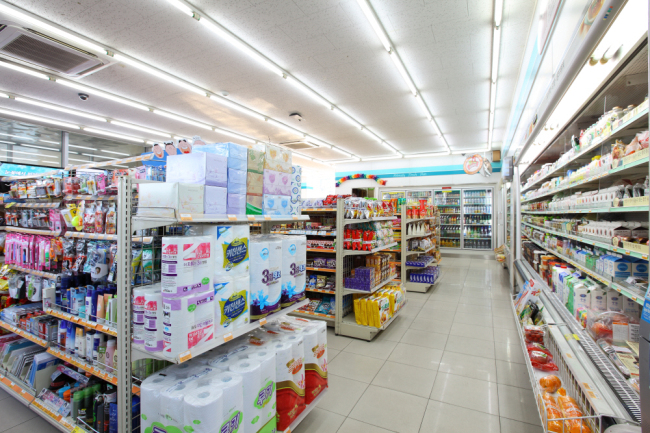[Weekender] At your convenience
Convenience stores reign over retail as consumers shop and live alone
By 원호정Published : Dec. 16, 2016 - 19:51
Ethan Kim, a 33-year-old marketer living in Seoul, says he cannot remember the last time he was in a grocery store.
“I do most of my shopping online,” he says. “Everything else, I buy at a convenience store near my house. I usually stop and get something for dinner on my way home from work.”
As the number of single-person households continues to rise in Korea, convenience stores have become the new offline retail outlets of choice, a rare sector of growth in a sluggish retail climate. According to data from Statistics Korea, one-person households make up 27.2 percent of all households in Korea.
Convenience stores have capitalized on the unique needs of people like Kim who live alone, particularly in the food department. Along with booming sales in prepackaged boxed meals, sales of home meal replacements, or instant single-serve foods, reached 2 trillion won ($1.7 billion) in 2015, according to an estimate from NH Investment & Securities.
“I do most of my shopping online,” he says. “Everything else, I buy at a convenience store near my house. I usually stop and get something for dinner on my way home from work.”
As the number of single-person households continues to rise in Korea, convenience stores have become the new offline retail outlets of choice, a rare sector of growth in a sluggish retail climate. According to data from Statistics Korea, one-person households make up 27.2 percent of all households in Korea.
Convenience stores have capitalized on the unique needs of people like Kim who live alone, particularly in the food department. Along with booming sales in prepackaged boxed meals, sales of home meal replacements, or instant single-serve foods, reached 2 trillion won ($1.7 billion) in 2015, according to an estimate from NH Investment & Securities.

Overall, analysts estimate that the convenience store market has already broken 20 trillion won in sales, with forecasts bringing the total to 28 trillion next year.
Once known mainly for cheap, disposable products and cigarettes, convenience stores have now become major outlets for food, coffee and consumer services like package deliveries.
Convenience stores’ greatest strength is their ubiquitousness. There are over 30,000 convenience stores in Korea, making them the most accessible type of brick-and-mortar retail stores. Combined with their 24-hour operations and their broad spectrum of products from food to household items to certain pharmaceuticals, convenience stores are solidifying their place as one-stop destinations for small-scale shopping.
Convenience stores are moving quickly to make the most of their popularity. By rolling out private brand products, the large convenience store chains are differentiating themselves from one another and luring in customers. Some convenience store-only products are basics like bottled water; others are quirky collaborations with established manufacturers that hope to set off a buzz on social media.
“We are seeing that increasingly, offering high-quality products at low prices are no longer sufficient to bring customers into our stores, rather than buying things online,” said Lee Na-ra, a spokeswoman for 7-Eleven, one of the top three players in the sector.
According to Lee, manufacturers are also taking note of convenience stores’ ability to market and move products quickly while gaining attention on social networks with the unique collaboration with well-known brands.
“In the past, it used to be difficult to get manufacturers to agree to collaborations with us. They saw grocery stores or discount retailers as better test beds. But now, we are getting approached first,” she said.
Past collaborations have included those with upper-tier brands like Swarovski and Bearbrick. Companies like spirits maker Diageo, which have traditionally held a luxury image, are rolling out products such as 200-milliliter bottles of Johnnie Walker whiskey and Smirnoff Vodka for sale at convenience stores.
Consumer services are another sector that have given convenience stores a boost.
E-commerce companies such as eBay Korea’s Gmarket and Auction as well as SK Planet’s 11st have signed deals with convenience stores to have packages ordered online delivered to convenience stores rather than to people’s homes, and even to install kiosks inside convenience stores where people can order additional merchandise online. Convenience store locations in residential areas that have a high population of one-person households have made them hubs for absorbing retail demand from this demographic.
This year, service collaborations even spilled over to the finance sector with KEB Hana Bank rolling out cash withdrawal services at convenience store counters.
Analyst Lim Young Joo, writing for Heungkuk Securities, forecast that “continued development of food products and services for single-person households will continue to make convenience stores profitable in the medium and long term.”
By Won Ho-jung (hjwon@heraldcorp.com)







![[From the Scene] Monks, Buddhists hail return of remains of Buddhas](http://res.heraldm.com/phpwas/restmb_idxmake.php?idx=644&simg=/content/image/2024/04/19/20240419050617_0.jpg&u=20240419175937)







![[From the Scene] Monks, Buddhists hail return of remains of Buddhas](http://res.heraldm.com/phpwas/restmb_idxmake.php?idx=652&simg=/content/image/2024/04/19/20240419050617_0.jpg&u=20240419175937)

![[KH Explains] Hyundai's full hybrid edge to pay off amid slow transition to pure EVs](http://res.heraldm.com/phpwas/restmb_idxmake.php?idx=652&simg=/content/image/2024/04/18/20240418050645_0.jpg&u=20240419100350)

![[Today’s K-pop] Illit drops debut single remix](http://res.heraldm.com/phpwas/restmb_idxmake.php?idx=642&simg=/content/image/2024/04/19/20240419050612_0.jpg&u=)